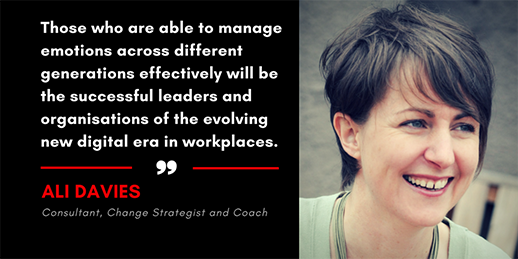Why Emotional Management Improves Performance and Results

Ali Davies is a Consultant, Change Strategist and Coach with over 30 years experience. She helps people create change to achieve the results that matter most to them. For more information about Ali and her work, visit her website www.alidavies.com
The quest to create change to deliver tangible and consistent results can feel challenging in our fast-evolving digital era and the many changes it is bringing.
Dealing with this successfully requires collaboration, commitment, action and a shared sense of direction and purpose by everyone within an organisation and team.
However, often there is a reliance and focus on conventional approaches and methodologies. But as the digital era becomes the new norm, conventional approaches are rapidly becoming less relevant, less effective and can hold back progress and results. Plus, they often overlook a powerful skill and strategy that would increase the prospects of success.
That factor is emotional management. By emotional management I mean the ability to proactively identify how and why individual and group emotions will impact performance, progress and results and have strategies, processes and methods to effectively manage those to achieve specific outcomes.
Why Effective Emotional Management Improves Performance and Sustainable Commitment at work.
Creating change or achieving specific results is driven by how we behave. And our behaviour is heavily influenced and driven by how we think and feel. So, our emotions have a significant impact on how we behave and, therefore, on end results.
So, not only is emotional management an important skill to improve performance, it is also important for increasing commitment at work because people’s emotions drive how they feel about their workplace, job, and impacts their engagement, loyalty and commitment.
Therefore, unless we understand and manage emotions effectively, results become less predictable, less consistent and less sustainable. People become less engaged and committed. Loyalty isn’t as strong.
One problem is that emotional management is a subject not commonly talked about, let alone embraced. Rarely do you hear conversations, especially in the workplace, about emotions and how they impact current and future results. It is not often a factor considered when developing strategy and plans. That needs to change.
How can we develop Emotional Management as a skill?
The starting point is for emotional management strategies to be integrated into organisational culture, policy and processes.
Creating a simple matrix that maps out desired outcome/result, identifies behaviours that will achieve that, clarifies what emotions will likely drive those behaviours, and a strategy to create that emotional culture at an individual and collective level, is a powerful way to start doing this. Implementing this matrix along with behavioural change strategies will help with developing emotional management skills.
In addition, there is another aspect to emotional management that often goes untapped by organisations. It is this:
Harnessing the power and potential of integrating all generations. Older people bring with them an emotional maturity, dynamic, and wisdom that only comes with decades of life and work experience. Younger people bring a different set of emotions to the table. Integrating both ends of the generational scale with a strong emotional management strategy can create a powerful cultural dynamic that improves individual and collective effectiveness.
Leaders who embrace this approach can give themselves and their organisation a strong platform to maximise potential and create get better results consistently. However, many organisations are not focusing on integrating generations with effective emotional management polices and strategies and so potential, opportunity and possibility is lost.
Why has Emotional Management become so important today within organizations?
A key success factor in workplaces is cooperation. Cooperation is driven by individual and collective behaviour of people of all generations. And behaviour is heavily influenced by emotions. Those who are able to manage emotions across different generations effectively and incorporate them into process and strategy will be the successful leaders and organisations of the evolving new digital era in workplaces.
And that is why emotional management is not just an important skill to learn and implement but is fast becoming a leadership imperative.
But emotion is often seen as a “soft” subject, because it is not tangible. But, just because we cannot easily apply metrics to emotion or note its value on a P&L, its impact on outcomes is still significant.
Emotional management is, I believe, one of the main leadership skills and strategies required to succeed and thrive in the fast-evolving digital era. Those who do not accept and embrace this aspect of management and leadership will not only miss opportunities but will also start to lag leaders and organisations that embrace and prioritise emotional management.
Ali Davis, for the Octave webmagazine
Share this Post








